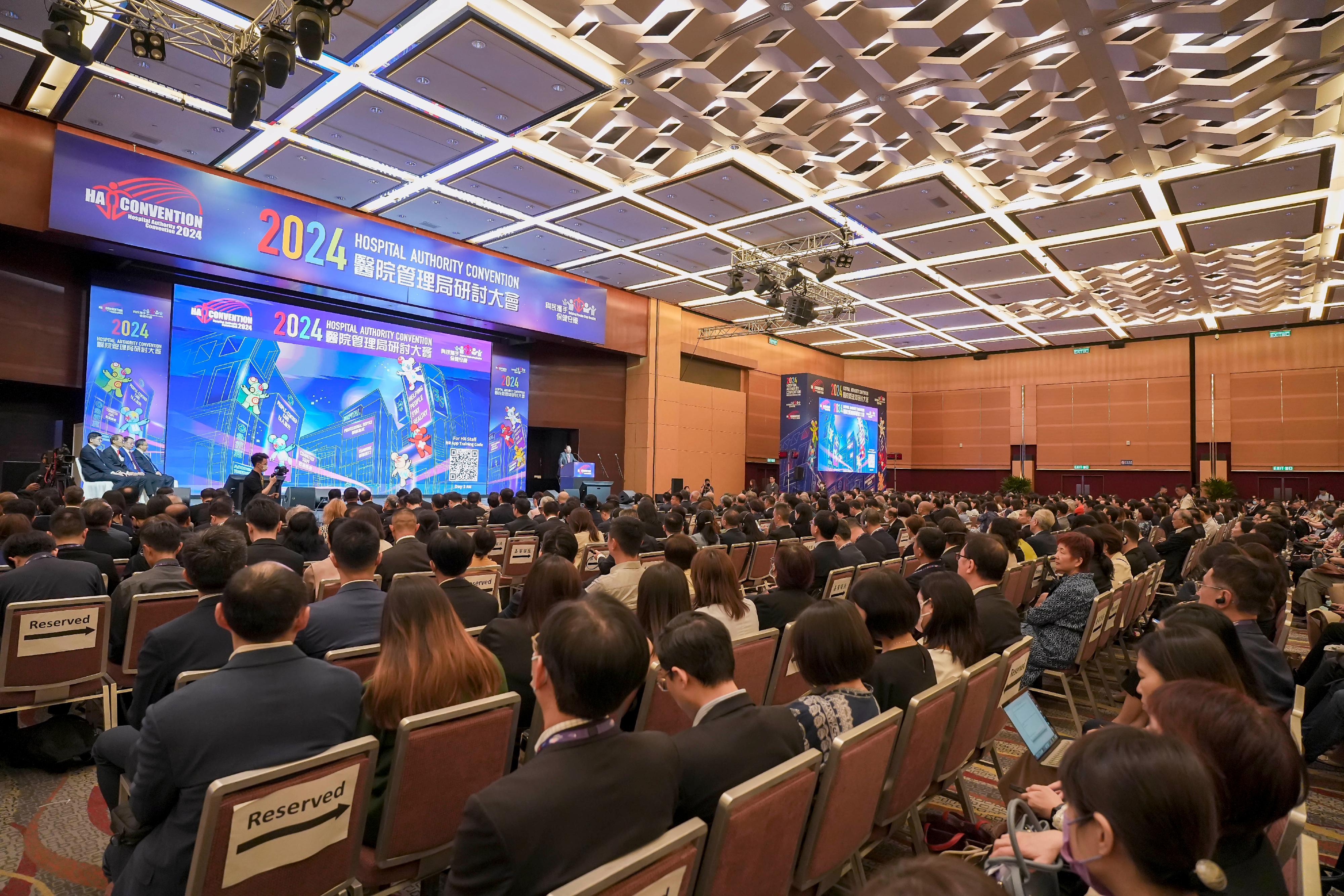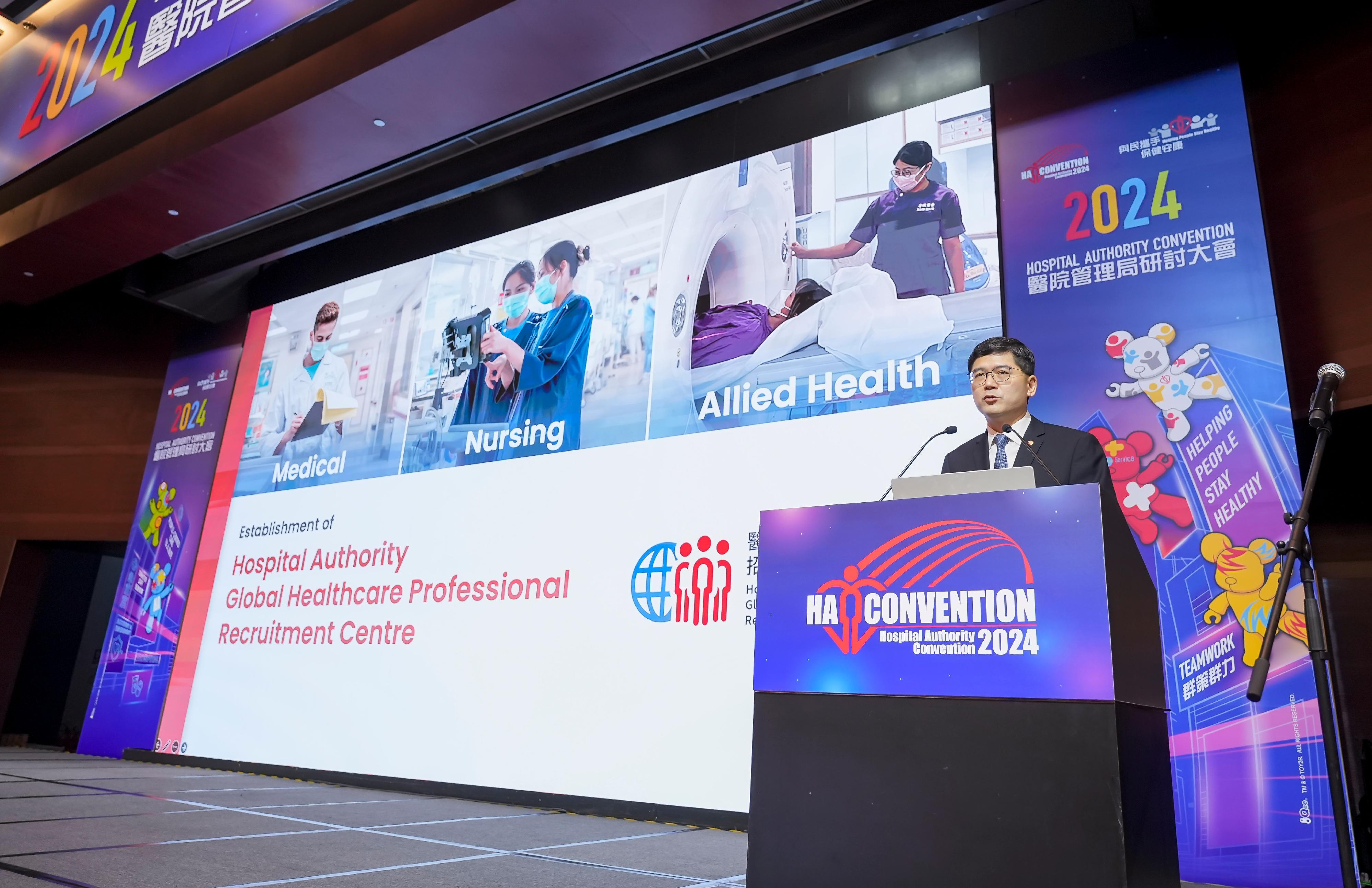The following is issued on behalf of the Hospital Authority:
The Hospital Authority (HA) Convention 2024 is being held at the Hong Kong Convention and Exhibition Centre in both physical and virtual formats today and tomorrow (May 16 and 17), with around 160 overseas, Mainland and local distinguished speakers sharing their knowledge and insights on various health topics of interest with over 7 000 healthcare and academic professionals.
The HA Convention this year is focusing on the HA’s core values, namely People-centred Care, Professional Service, Committed Staff and Teamwork. It aims to promote the sharing of knowledge and experience on clinical advances and approaches to modern healthcare service, and facilitate exploration and discussion of contemporary concepts among healthcare professionals and stakeholders.
The HA Convention 2024 was officially opened this morning by Vice-Minister of the National Health Commission of the People’s Republic of China Mr Cao Xuetao; the Chief Secretary for Administration, Mr Chan Kwok-ki; the Secretary for Health, Professor Lo Chung-mau; the HA Chairman, Mr Henry Fan; and the HA Chief Executive, Dr Tony Ko.
In his welcome address, Mr Fan said that the HA has been strengthening its recruitment effort for healthcare professionals worldwide and significant progress has been made. The number of non-locally trained doctors in the HA has increased from over 40 in 2022 to about 150 at present. “With the establishment of the HA Global Healthcare Professional Recruitment Centre last year to provide one-stop services for potential candidates, we have seen a further boost in enquiries and applications. We are confident that by the end of this year, over 250 non-locally trained doctors would be working at the HA,” he said.
He mentioned that the HA has been collaborating with various Mainland cities in the Greater Bay Area (GBA) and beyond to commence diversified exchange programmes. Currently, more than 100 Mainland healthcare professionals are working at public hospitals through the GBA Healthcare Talents Visiting Programmes. The HA will further promote exchanges of Hong Kong healthcare professionals to the Mainland in the future.
Mr Fan also expressed gratitude for the Hong Kong Special Administrative Region Government for increasing the funding for the HA despite the pressure on public finances. The annual funding to the HA will be increased to $95.4 billion in 2024-25. The HA will continue to enhance sustainability of healthcare services. He said, “Apart from modernising the hospital hardware, the HA is taking forward a series of measures to address the structural issues in managing the escalating service demand arising from the ageing population, rising prevalence of chronic illnesses and the increasing community expectations. These measures include reorienting service models and strengthening the development of ambulatory care services.”
Delivering his keynote address, “Championing Sustainability Development and Driving for Excellence”, Dr Ko shared his vision for a sustainable development of the public healthcare system.
“In the face of the fast-evolving future of healthcare and paradigm shift of service delivery model, we must upgrade both our hardware to increase service capacity on one hand, while developing an agile workforce in the new era and reorienting our service delivery model on the other hand. We do so by leveraging big data, advanced technology and artificial intelligence (AI) to improve health outcome and enhance operational efficiency,” he said.
Dr Ko emphasised that the HA has adopted a multi-front human resources strategy to strengthen the existing healthcare workforce and to continue to recruit talent both locally and around the world. The HA Global Healthcare Professional Recruitment Centre was established last year to co-ordinate the recruitment of healthcare talent from around the world. He said, “Riding on the success of the recruitment of non-locally trained doctors, we are extending the recruitment to suitable non-locally trained healthcare professionals, including nursing and allied health staff. One-stop service and comprehensive information would be provided by a designated team to facilitate the process.”
He mentioned that the HA is taking forward various talent-exchange programmes to promote Hong Kong as an international hub for healthcare professionals. About 30 non-locally trained doctors will engage in medium-term exchanges in 10 public hospitals through the Global Healthcare Talent Scheme to gain exposure to cutting-edge medical technologies and research experience across nine specialties. In the past year, about 100 doctors, nurses, radiographers, and Chinese Medicine (CM) practitioners from the Mainland had completed their exchange under a series of the GBA Healthcare Talents Visiting Programmes. Thirteen senior GBA CM experts of various specialties have come to Hong Kong to share their knowledge and expertise by providing in-depth clinical training to over 100 local CM practitioners under the model of clinical apprenticeship.
“In the face of manpower shortage, the HA has long demonstrated our ongoing commitment to investing in human capital through training and development, aiming to sustain a robust talent pool of diversified, solidary and competent healthcare staff. Together with attracting new blood and facilitating the inflow of diverse talent from different regions, the HA will continue to contribute to reinforcing Hong Kong’s role as a talent hub full of opportunities for our valuable healthcare professionals.”
On the hardware side, the HA will continue to upgrade its hospital facilities to enhance capacity and service capabilities. Dr Ko stated, “The HA is actively pursuing the first Hospital Development Plan in the order of some $200 billion, adding about 6 000 additional hospital bed spaces and 90 operating theatres. In parallel, the HA is planning for the second Hospital Development Plan with a budget size of $270 billion.”
The HA has also actively adopted various forms of advanced information technology, digital technology and AI infrastructure in order to enable Smart Care and enhance productivity. Dr Ko cited the HA mobile application, “HA Go”, as an example, highlighting how leveraging technology can significantly improve patient experience.
“With ‘HA Go’, one can check appointments made in HA hospitals or clinics, pay HA bills and drug charges, book appointment for general outpatient services and new case of specialist outpatient services, etc. Currently, ‘HA Go’ has more than 2.5 million registered users, where patients can be empowered to manage their own health at their fingertips,” he said.
Furthermore, the HA will continue to promote the development of Integrated Chinese-Western Medicine (ICWM). Since early last year, the ICWM services have been regularised and further expanded to 26 public hospitals across seven clusters, with the hospital sites increasing from eight to 53.
“Under the service framework, Chinese medicine practitioners (CMPs) and WM doctors will collaborate in formulating a clinical treatment protocol for each of the selected disease areas. They will team up to jointly assess the suitability of in-patients for CM treatment, and conduct ward rounds and consultations together. To facilitate collaboration, CMPs will review clinical records of patients in the HA Clinical Management System and input CM clinical notes.”
In his concluding remarks, Dr Ko said, “We are reshaping the future of healthcare from provider-centric to patient-centric, from conventional to smart and digitalised, and from within to beyond hospital walls.” He said he is confident that with the determination of all members of the HA and the support from the community, the HA will build a brighter future of sustainable public healthcare.
read more





